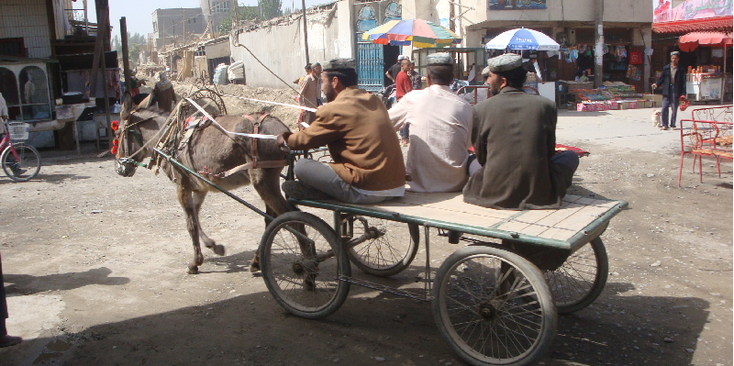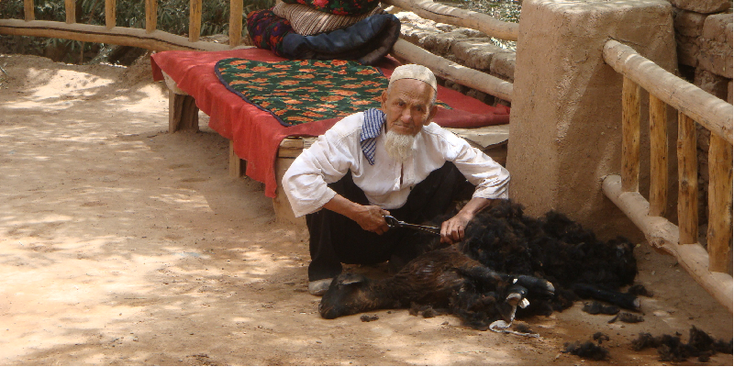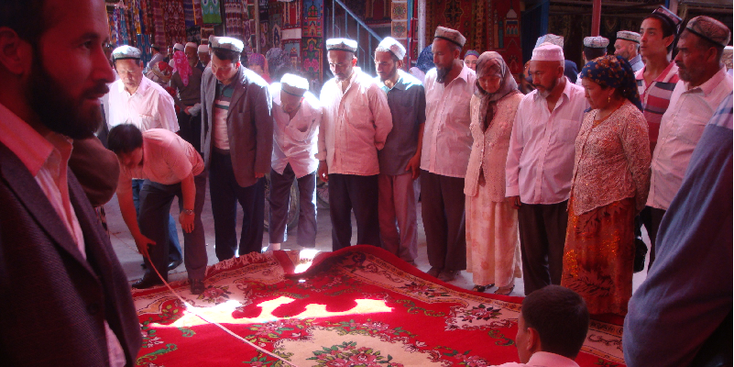Hotan
Travel Stories - China

introduction

My bus is already there when I arrive at the bus station of Turpan which is a relief. The first bed in this sleeper (bus in where you can sleep) is mine and I immediately notice that it is too small and a little crooked. There is a big thick wool blanket on my "bed" and the bus smells already stale before all the local people are in it.
If the bus leaves I can only lie down (it is too low to sit) and I enjoy the smell of the fresh bread next to my head from my neighbour. The other travelers are a mixture of families with children, unhappy young boys and remarkably good-looking girls of a strange mix of Mongolian, Chinese and Turkish.
While the man behind me feasts on a bag of eggs that he eats one by one, the landscape can be described as a "lord of the Rings" country; steep, sharp rocks with here and there sand and a black background. Mysterious and beautiful at the same time.
Taklamaka desert
When we stop for food the driver calls "10 minutes" and I decide not to heat my noodles because of the short stop. If we are still there 30 minutes later I’m hitting myself form y heat because I hear my stomach rumbling. While reading my book, I listen to the drivers and helper who have gathered in front of me at the front door. The language is not Chinese but certainly not Turkish or Arabic but a mix of all three.
There are prayers by some people when we arrive in Kuqa and we stand still for hours on a big road which serves as a bus station. By lying in the same position all day, your muscles start to get pretty irritated and when I try to sleep at night, the Arab music that comes from the radio keeps me awake. If I fall asleep anyway, I wake up to the fact that we are standing still. I have to pee and walk into the desert because we seem to be in the middle of the Taklamaka desert.
It is dead silent, pitch dark and the stars are so bright in the sky while there is no wind at all. The air is fresh and it is clearly a sand desert because the sand is accumulating on the road. I pull the stale carpet-blank on top of me and try to get some sleep before we arrive in Hotan.

XINJIANG - history:
During the 9th century, the ancestors of the Ugur were expelled from their native country Mongolia. The population exchanged the nomadic existence for life as a farmer and switched from Buddhism to Islam in the 14th century.
After the Mongols, Timur and the Russians were gone, a Kokandi tried to establish an independent Turkestan in 1865. Chinese troops moved into the area for a few years and established the state of Xinjiang which means new frontier. Many raw materials such as oil and gas are available in the area.
In 1940 another attempt was made for an independent state by the Kazak Osman in collaboration with a rebel group consisting of Mongols, Kazaks and Ugur. When the Communists took over China, the plane in which the most prominent rebel leaders crashed on their way for talks in Beijing. Osman continued to fight until he was caught and executed in 1951. From then on, the Chinese government is busy drawing politically as many Han Chinese into the area with social and economic promises.
Long ago the area consisted of 90% Ugur people - now half of them is Ugur. The relationship between the two population groups has never been good, but then really came into focus. Ugurs admit that a lot of money is being pumped into the region, but this mainly benefits the Han. In the nineties and in 2001 it often came to riots where thousands of Ugur were arrested and some even executed. The Chinese showed a little help to the Americans to pick up Muslims under the guise of terrorism and put thousands in jail again.

Silk road city Hotan

When I wake up in the early morning I look outside the window and we drive past a varied landscape; a mix of sand, here and there a piece of green and then a rock party or a village. And then I see my first Kazakh hat with floppy ears.
It is mid-morning when we are dropped at a dusty village, which means that you can put your sandals on again (inside the bus you’re not allowed to wear them) and I have breakfast in the form of some fruit. It’s already afternoon when we finally arrive in Hotan, which turns out to be a pretty big city with many small shops. I check in in the hostel and there is a reasonable park laid out but for this you have to pay.
Also is there is a kind of market street without cars, but the mystic that you want to feel and see here as like in the Silkroute-time is lacking completely. The province's most famous landmark is of course this "Silk Road" that went straight through the desert and visited cities such as Hotan and Kashgar which gave it a very romantic note. But do not expect a romantic image here as you see on old mystical drawings and frescos - Hotan is a big city, chaotic and you really have to look through it to see the old atmosphere.
"Bosh" at the bazaar

Today I walk the other way towards the gigantic bazaar that the city is now known for. The market starts much earlier than indicated on the map and the smell of fresh bread, dates, spices, herbs, but also of animals such as donkeys and goats comes from far away. Through some big busy roads where the market has already begun on the sidewalks, it gets busier as you get closer to the real thing.
If you walk under the gate you enter the real bazaar section and you have to be careful immediately; when the people from the market scream “bosh” you have to get out of the way as soon as possible – then a card has to go through. The market is divided into certain sales items. For example, you have a section of old iron, clothes, curtains, shoes, pans and rugs. As far as I can see I’m the only Western tourist here. It strikes me that there are no mobile phone calls or scooters to hear or see and the number of Han Chinese is negligible here. It looks more like the Middle East than China.
In a central location slightly away from the busy aisle, I sit down with my bought lunch and watch the total spectacle of this chaotic market. The beautiful colors of women's scarves and dresses, the donkey riders and the different colors and shapes "fez". Also many dust coats, djellabas and veiled women between the thousands of different skin colors and populations. Apparently your guilder is still worth a diminishment given the inimitable procession of people passing by here. At the bus station I already buy a bus ticket for tomorrow and fall asleep in bed in the afternoon. But not after I have ordered another delicious shaslick.

tips & advice (2009)

There is a national airport located about 10 km west of the city. The bus station is centrally located on the Taibei Xilu street.
Hotan - Karghilik: there are a number of buses a day via Karghilik to the west. The duration is about 5 hours and the costs are around the Y30.

-
Name: Hotel Jiaotong Binguan (Hotan)
Address: Taibei Xilu
Price: 50 Yuan
Phone nr. : 203 2700
Content:
As so often the case in China, the hotels look like their best on the outside - inside it is usually disappointing after you have been at the reception desk. Again - it is fantastically located next to the bus station and the lobby looks good. The room is empty and a bit outdated even though the bed is fine. This hotel was still under construction and half of the rooms were not ready for use.
My room had no shower and no toilet - basically only a bed and a small cupboard. Breakfast not included and also not available.

see also:
LANDEN:
EUROPA:
Albanië * België * Bosnië-Herzegovina * Bulgarije * Denemarken * Duitsland * Engeland * Estland * Finland * Frankrijk * Griekenland * Hongarije * (Noord) Ierland * Italië * Kosovo * Kroatië * Letland * Litouwen * Luxemburg * Macedonië * Malta * Montenegro * NEDERLAND * Oekraïne * Oostenrijk * Polen * Portugal * Roemenië * Rusland * Schotland * Servië * Slovenië * Slowakije * Spanje * Tsjechië * Turkije * Zweden
NOORD EN CENTRAAL-AMERIKA:
Chili * Costa Rica * Cuba * Guatemala * Mexico * Nicaragua * Panama * Verenigde Staten
ZUID-AMERIKA:
Argentinië * Bolivia * Brazilië * Colombia * Ecuador * Peru
AFRIKA:
Botswana * Burkina Faso * Egypte * Ethiopië * Ghana * Kenia * Mali * Marokko * Namibië * Oeganda * Senegal * Tanzania * Tunesië * Zuid-Afrika
MIDDEN-OOSTEN:
Iran * Israël * Jordanië * V.A.E.
AZIE:
Armenië * Cambodja * China * Filipijnen * Georgië * India * Indonesië * Japan * Kirgizië * Laos * Maleisië * Mongolië * Myanmar * Nepal * Oezbekistan * Singapore * Sri Lanka * Thailand * Vietnam
OCEANIE:
Voor meer reisfoto's kijk op www.instagram.com/cheapskatetravel.nl:
© Cheapskatetravel.nl; 2018 (all rights reserved)


